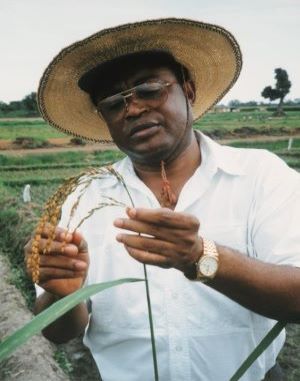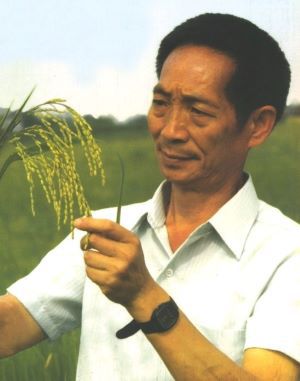

Monty P. Jones and Yuan Longping
UNITED KINGDOM, CHINA
Monty P. Jones developed NERICA—“New Rice for Africa”—by crossbreeding high-producing Asian plants with African varieties that thrived in the region’s poor soils and drought conditions. Yuan Longping, the “Father of Hybrid Rice,” discovered a genetic phenomenon in rice and then developed the technologies essential for breeding the first hybrid rice variety ever created.
Full Biographies
Dr. Monty Jones
Born in Sierra Leone, Monty P. Jones was educated there, receiving a bachelor’s degree from the University of Sierra Leone. He next attended Birmingham University in the United Kingdom, where he earned a master’s degree in 1979, a doctorate in plant biology in 1983, and an honorary Doctor of Science in 2005.
He began his career in 1975 at the Africa Rice Center, one of the research centers sponsored by the Consultative Group on International Agricultural Research (CGIAR), in its Mangrove Swamp Rice Research Project in his home country. He continued to work as a rice breeder and researcher through the 1980s.
In 1991, Jones was appointed head of the Upland Rice Breeding Program at the Africa Rice Center, then located in Côte d’Ivoire. It was in this position in 1994 that he made his exceptional breakthrough achievement in combining Asian and African rice varieties to develop NERICA, a “New Rice for Africa” uniquely suited to poor African rice farmers.
Jones had observed that low-yielding native African rice varieties grew most successfully in the continent’s alkaline soils and conditions of varying moisture. However, their yield potential was remarkably low, especially compared to the more productive varieties introduced from Asia which had low resistance to African pests and diseases and did not adapt well to the soil and climate. Combining these species had been attempted before, but had never met with success because early in the crossbreeding process the progeny rice varieties always developed sterility.
Jones led his staff to organize and classify all available rice varieties, including 1,500 accessions of the native O. glaberrima species, which were in danger of extinction. From this collection, Jones and his team began the painstaking process of selecting parents for combination traits, crossing them to produce offspring, and backcrossing the offspring to fix varietal traits from the two species and overcome the sterility barrier. After three years of breeding research, the first stable and fertile cross was produced.
With the ability to resist weeds, survive droughts, and thrive on poor soils gained from its African parent and the trait of higher productivity from its Asian ancestor, NERICA rice is capable of increasing farmers’ harvests by 25 to 250 percent. It has been especially valuable in the drier upland regions, where much of West Africa’s rice is grown, with yields reaching four to six tons per hectare. In addition, its shorter, three-month growing time – as opposed to the six months required by parent species – allows African farmers to harvest NERICA rice during the annual “hunger period” when food reserves run out, and to double-crop with nutritionally rich legumes and vegetables or high-value fiber crops in one growing season.
For the consumer, especially poor or malnourished families, NERICA provides increased amounts of protein at a lower price. The nutritional, economic, and political impact of NERICA on countries that previously had to import rice annually is difficult to overstate.
Jones continued to show leadership and innovation in taking NERICA rice to farmers in Africa’s villages. He built partnerships with the West Africa Rice Development Agency and policy makers, non-governmental organizations, and research and extension services. He outlined a plan for community-based, participatory, and gender-sensitive programs that would both rapidly disseminate the seeds and allow rice farmers – a majority being women – an active role in planting and evaluating the hybrids and continuing outreach in rural areas.
For his breakthrough achievements in creating a rice variety specifically bred for the ecological and agricultural conditions in Africa, Jones won The World Food Prize jointly with Yuan Longping of China, also a rice researcher, in 2004 – which was declared the United Nations International Year of Rice. With his World Food Prize monetary award, Jones continued to support and invest in the extension of programs such as those in Sierra Leone and the rest of Africa.
Jones’ work led to the rapid development of more than 3,000 NERICA lines. As demonstrated in pilot projects undertaken in Benin, Côte d’Ivoire, Gambia, Guinea, Mali, Nigeria and Togo, NERICA benefited 20 million rice farmers and 240 million consumers in West Africa alone, in addition to other parts of Africa and the world. In the early 21st century, NERICA resulted in over 30 percent expansion in upland rice cultivation in Nigeria, and Guinea’s rice imports were reduced by 50 percent in three years, allowing the country to become a net exporter of rice in 2005.
In 2002, Jones was appointed the executive secretary of the Forum for Agricultural Research in Africa (FARA), based in Ghana. At FARA, he oversaw advocacy and coordination efforts in support of regional research, with the goal of increasing agricultural growth by at least six percent annually by 2020 as well as fostering ongoing economic growth, alleviating poverty and improving food security for Africa’s people. In 2007, Time magazine named Jones as one of the world’s most influential people. In 2013, Jones was appointed Special Adviser to the President and Ambassador at Large for the Republic of Sierra Leone.
According to the Africa Rice Center’s Director-General, Papa Abdoulaye Seck, “Dr. Monty Jones has demonstrated by his remarkable contribution that is it possible to reshape the agricultural map of our continent through the African creative genius.”
Prof. Yuan Longping
Born in Beijing in 1930, Yuan Longping graduated from Southwest Agricultural College in Chongqing, China, in 1953 with a major in agronomy. Upon graduation, he accepted a teaching job at the Hunan Agricultural University in Anjiang, China.
In the 1950s and ‘60s, classical genetics concluded that heterosis - a phenomenon in which the progeny of two distinctly different parents grow faster, yield more, and resist stress better than either parent – was not possible in self-pollinated crops such as rice. Thus it did not seem possible to produce high-yielding hybrid seeds in rice as had been done in other crops.
Nevertheless, Yuan believed that heterosis is a universal phenomenon and rice is no exception. In his off hours, he conducted scientific experiments involving asexual crosses between crops; he concluded that there were faults in the accepted breeding approach.
After nine years of research, Yuan published his findings in 1964, outlining unique genetic tools, which were essential for developing the first-ever hybrid rice. Yuan continued his research, moving in 1971 to Hunan Academy of Agricultural Sciences, where he served as a research professor.
In 1973, Yuan successfully developed the first hybrid rice combination called Nan-you No. 2 which, due to heterosis, boasted yields 20 percent higher than previous varieties. By 1975, Yuan and his colleagues had summarized a complete set of seed production technologies, and the large-scale production of hybrid rice began. The following year, in 1976, Nan-you No. 2 was put into commercial production. With this new rice variety and improved techniques, food availability in China began to improve.
In the following three decades, planting of hybrid rice spread so widely that by the early 21st century, almost half of China’s rice production area was planted in hybrid rice. This higher-yielding crop produced food to nourish approximately 70 million more people per year in China alone, helping China solve food shortage challenges successfully and providing additional income to numerous farmers.
Yuan and his colleagues continued their work and developed numerous new strains of “super hybrid rice” that produce almost 10 tons per hectare. With higher yields, farmers increased rice production while simultaneously shifting millions of hectares out of rice and into alternatives such as fishponds, vegetables, fruits and other food and fiber crops to provide a more balanced diet and higher standard of living to rural Chinese families. China was able to establish its own hybrid seed industry, which today provides additional revenue and training opportunities to thousands of farmers.
The impact of Yuan’s ingenuity has been felt beyond China’s rice industry. Researchers and producers of other crops in China successfully used the two-line breeding system for rice to explore similar systems for hybrid sorghum and rapeseed with increased yields.
Yuan’s new hybrid rice technology not only benefited China, but was also enthusiastically adopted in other countries. Yuan introduced Chinese hybrid rice to the world in 1979 at an international conference sponsored by the International Rice Research Institute in the Philippines (IRRI). The following year, IRRI restored its own hybrid rice research. In light of Chinese success, many countries, institutions and commercial companies started their own hybrid rice research. The United Nations Food and Agriculture Organization (FAO) made hybrid rice the first choice of its program to increase grain production outside China, and appointed Professor Yuan as the chief consultant.
In 1984, Yuan became the Director-General of China’s National Hybrid Rice Research and Development Center and he became a member or leader of several national committees, conferences and foundations that support agriculture, science and technology in China.
Yuan built a legacy of combating food shortages and hunger. He and his research associates traveled to India, Vietnam, Myanmar, Bangladesh, Sri Lanka and the United States to provide advice and consultation to rice research personnel. Yuan’s research institute has trained over 3,000 scientists from more than 50 countries. Farmers around the world have benefitted from his techniques as hybrid rice spread throughout Asia, Africa and the Americas.
For his breakthrough achievement in developing the genetic materials and technologies essential for breeding high-yielding hybrid rice varieties, The World Food Prize was awarded to Yuan Longping and Monty Jones, also a rice researcher, in 2004, which was declared the United Nations International Year of Rice.
In addition to the 2004 World Food Prize, Yuan’s honors and awards include China’s State Supreme Science and Technology Award, the 2001 Magsaysay Award, the UN FAO Medal of Honor for Food Security, and the 2004 Wolf Prize in Agriculture. Additionally, in 2007, he was named a foreign associate of the National Academy of Sciences in the United States, which is one of the highest honors in American science and engineering. Yuan became the first non-American NAS member from the Chinese agricultural science circle.
Yuan’s pioneering research helped transform China from food deficiency to food security within three decades. His accomplishments and clear vision helped create a more abundant food supply and more stable world. Yuan’s distinguished life’s work has caused many to call him the “Father of Hybrid Rice,” while his continued research has offered even more promise for world food security and adequate nutrition for the world’s poor.
Additional Links
2004 WFP Laureates Elected to U.S. National Academy of Sciences
Laureate Spotlight: Yuan Longping
2004 Laureate Monty Jones to Head Global Forum for Agricultural Research
Business Insider: Longping's Innovations to Rice Growing
International Rice Research Institute (IRRI): Doubly Green Revolution in Rice
NYTimes: "Yuan Longping, Plant Scientist Who Helped Curb Famine, Dies at 90"
AP News: "China's Yuan Longping dies; rice research helped feed the world"
HKIBC News: "Yuan Longping, Father of Hybrid Rice, Died"
Bloomberg: "China Mourns Death of Man Who Saved Millions From Hunger"


